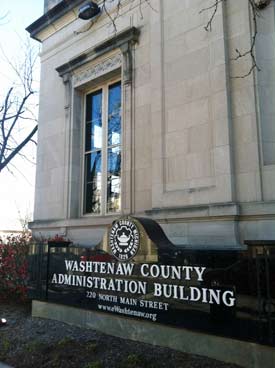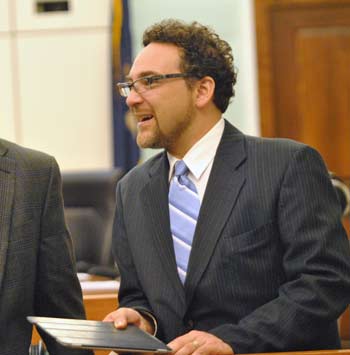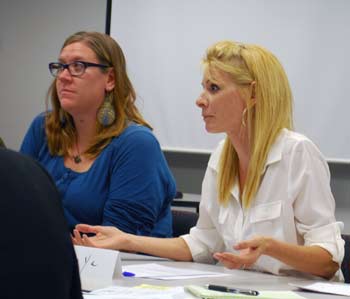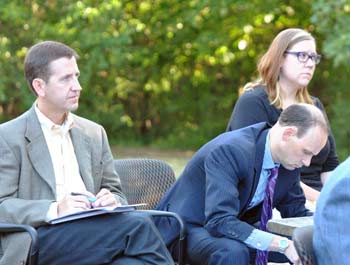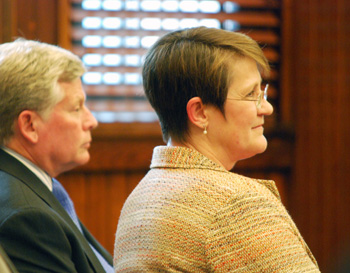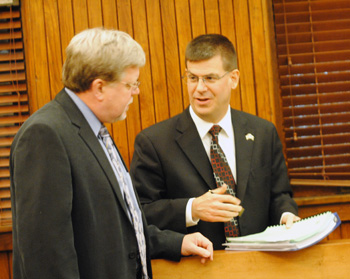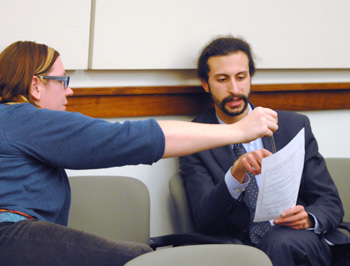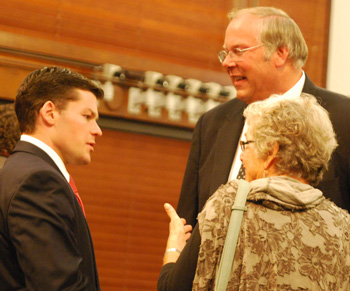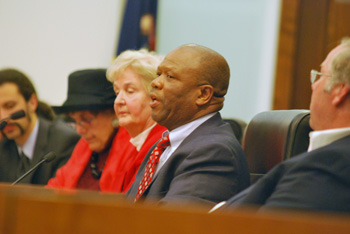Washtenaw County board of commissioners meeting (May 16, 2012): Budget issues threaded through most topics raised at the recent county board meeting. Some were obvious, like the first-quarter budget update, and some less direct, like the stalled effort to develop a policy for animal control services.

Republican Alicia Ping and Democrat Wes Prater currently serve Districts 3 and 4, respectively, on the Washtenaw County board of commissioners. They will face each other in the Nov. 6 general election due to redistricting of the board that takes effect in the next election cycle. They’ll both vie for the new District 3. The filing deadline for candidates was the day before the board’s May 16, 2012 meeting. (Photos by the writer.)
The 2012 budget update covered the first three months of the year, but also looked at projections for the full year. Overall revenues for the general fund are now projected to be about $1.165 million more than budgeted in 2012 – thanks in large part to about $2.5 million more in property tax revenues than originally anticipated, but offset by revenue shortfalls in other areas. Total revenues for the 2012 general fund are expected to reach $99.9 million.
But expenditures for the general fund are $893,527 more than budgeted, primarily due to $669,000 in higher-than-expected costs in the sheriff’s office from greater use of part‐time temporary workers and overtime, operating supplies, and jail medical/food contracts.
The 2012 budget had anticipated a surplus of $1.889 million, but the administration is now projecting a surplus of just $272,238. That surplus is intended to carry over into the 2013 fund balance – so the county faces a $1.617 million shortfall in the amount it had budgeted for the fund balance contribution in 2013. Currently, the county has a $14.5 million fund balance.
Tina Gavalier, the county’s finance analyst, told commissioners that she’ll have a much clearer picture of the budget outlook when she gives a second-quarter update at the board’s Aug. 1 meeting. She listed out several areas that the administration intends to monitor closely, including medical costs, state revenue-sharing, personal property tax reform, and actuarial valuations for the retirement plan and retiree health benefits.
The board also took an initial vote to set the 2012 county general operating millage rate at 4.5493 mills – unchanged from the current rate. Several other county millages are levied separately: emergency communications (0.2000 mills), the Huron Clinton Metroparks Authority (0.2146 mills), two for county parks and recreation (0.2353 mills and 0.236 mills) and for the natural areas preservation program (0.2409 mills). That brings the total county millage rate to 5.6768 mills, which is also unchanged from 2011. One mill is equal to $1 for every $1,000 of a property’s taxable value.
This is an annual procedural action, not a vote to levy new taxes, and it’s typically passed without discussion. But this time Wes Prater raised concerns about a $29 million fund balance for the parks and recreation department, saying it was too high and wondering whether it indicated that the tax levy for parks should be lowered. Several other commissioners – including those who serve on the parks & recreation commission (which oversees those funds) – defended the fund balance, noting that several major capital projects are in the works that will tap that money.
In another budget-related action, commissioners gave final approval to the Urban County’s annual plan for July 1, 2012 through June 30, 2013 with a $3.59 million budget. The Urban County is a consortium of local municipalities that receive federal funding for projects in low-income neighborhoods. In a separate vote, the board approved adding Webster Township to the consortium, which includes the city of Ann Arbor, Ypsilanti and several townships.
Two residents spoke during public commentary, objecting to funding for Planned Parenthood that was included in the annual plan. That particular funding had already been approved last year by the board, as part of a coordinated funding model that pools includes money from the county, the Urban County, Washtenaw United Way, and the city of Ann Arbor to fund several dozen human services nonprofits.
Two commissioners commented on issues related to animal control services during the May 16 meeting. Barbara Bergman noted that there had been a “failed meeting” of a task force on May 9 – only she and board chair Conan Smith had attended from the board, although the task force is open to all commissioners. [See Chronicle coverage: "Low Turnout for Animal Control Task Force."] The intent is to set policy that will guide a request for proposals that the county plans to issue later this year, for its next contract to provide animal control services. Those services are currently handled by the Humane Society of Huron Valley (HSHV), in a contract that expires at the end of 2012. [A subsequent task force meeting on the morning of May 23 drew five of the 11 commissioners, and will be reported in a separate Chronicle article.]
A separate work group on animal control services is being led by the sheriff’s office. That group is tasked with developing a methodology to determine the cost of providing animal control services. It includes representatives from HSHV, the county, and other municipalities that have animal control ordinances. Commissioner Rob Turner, who serves on the group, reported that the HSHV has agreed to work with the county’s finance department to come up with a cost breakdown for the services it currently provides.
The May 16 meeting also included a brief swearing-in ceremony for Felicia Brabec, who won a May 8 special election to represent District 7. Brabec had been appointed to the board last October following Kristin Judge’s resignation. [Full Story]




